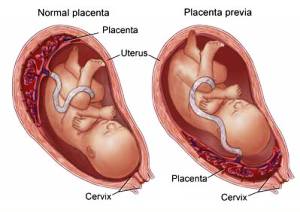Causes of Abnormal Vaginal Bleeding
There are various causes of abnormal vaginal bleeding. Abnormal bleeding from the vagina is a general term that describes bloody discharge that does not follow the normal pattern. It could be spotting between periods or heavier or lighter menstruation than what you would normally have.
Most women experience abnormal vagina bleeding at some point in their lives. Usually, there is nothing to worry about.
But vaginal bleeding is deemed to be abnormal if it occurs:-
- outside of your normal menstrual cycle.
- when your menstrual flow is lighter or heavier than what you normally experience.
- after sexual intercourse.
- at a time when there should not have blood coming from the vagina i.e. before a child reaches 10, when you are in your 4th month of pregnancy or after menopause.
What Can Cause Abnormal Vaginal Bleeding
Pregnancy - Some women experience light bleeding during the first trimester (i.e the first 3 months of a normal pregnancy). The bleeding occurs after fertilization (when the fertilized egg implants itself on the lining of the uterus. This is known as implantation bleeding and is not a cause for concern.
But you should always be cautious when you are pregnant, so do go for a medical checkup to rule out any complications.
If heavy vaginal bleeding that occurs during the first 3 months of pregnancy could be serious. There might be the possibility of an ectopic pregnancy or miscarriage.
Ectopic Pregnancy :- Ectopic pregnancy occurs when the fertilized egg implants somewhere other than the uterus wall. Usually on one of the fallopian tubes. Abnormal vaginal bleeding is sometimes the only sign of an ectopic pregnancy.
Miscarriage :- The term miscarriage is very upsetting. It is the loss of a fetus before the 20th week (or four and a half months of a pregnancy). The signals are spotting to heavy bleeding with fluid and tissue discharge as well.
And heavy bleeding that happens after the 20th week of gestation is not a good sign either. It could be placenta previa.
 Diagram of placenta previa
Diagram of placenta previaPlacenta
previa :- The placenta is an organ that develops inside the uterus during pregnancy. It connects to the baby through the umbilical cord. It functions to provide oxygen and nutrients to the baby and remove waste.
In normal circumstance the placenta is attached to the top or side of the inner uterine wall. In the case of placenta previa, the placenta attaches to the lower part of the uterus near the cervix. As a result, the cervix is partially or totally covered by the placenta tissue. When this happens it can cause severe bleeding during pregnancy or before or during delivery.
Refer to diagram above for a better idea of abnormal vaginal bleeding due to placenta previa.
A note of caution: Do not take vaginal bleeding during pregnancy lightly. Contact your doctor immediately if you are pregnant and experience vaginal bleeding.
Ovulation - Ovulation refers to the release of a single, mature egg from the ovarian follicles. Bleeding may occur during the middle of a menstrual cycle (mid-cycle).
Ovulation bleeding tends to be pink or red in color. It is lighter than a normal menstrual flow and generally last 1-2 days. Mid-cycle bleeding that last longer than a couple of days could be endometriosis.
Menstrual Cycles - Menstrual cycles that are longer than 35 days or shorter than 21 days. The lack of periods for 3-6 months (amenorrhea) is also abnormal.
Birth Control Methods - Using birth control can be one of the causes of abnormal vaginal bleeding. Birth control methods that contains hormones (pills, patches, shots, rings or implants). Doctors call this "break through bleeding". They believe bleeding occurs due to the extra hormones that cause changes in the lining of the uterus.
And this happens during the first three months after starting on the pill. Abnormal bleeding may also occur when the pill is not taken at a regular time each day.
Pelvic Inflammatory Disease - Pelvic inflammatory disease (PID) is an inflammation or infection of the uterus, fallopian tubes and ovaries. Abnormal vaginal bleeding is one of the common PID symptoms. Other symptoms of PID are lower abdominal pain, fever and smelly vaginal white discharge.
Sexually Transmitted Infections - STIs such as gonorrhea and Chlamydia can cause abnormal vaginal bleeding between periods.
Vaginal bleeding after sexual intercourse could be symptom of genital/vaginal warts
Menopause - After menopause, there is a drop in estrogen levels. As a result the vaginal walls become thinner and drier. Friction during intercourse tears the fragile vagina walls causing abnormal bleeding.
If menopausal vaginal dryness is the cause of bleeding after sex, applying a vaginal lubrication gel will help. It reliefs painful intercourse. Sex can still be very pleasurable after menopause.
Peri menopause, which starts around age 40 is also linked to abnormal uterine bleeding. As you get closer to menopause it is hard to predict your monthly period. Menstrual bleeding can be lighter or heavier than your pre -40 menstruation. As hormone levels change at this phase of your life, the lining of the uterus becomes thicker, so there could be spotting as well.
Do not ignore abnormal bleeding if you are menopausal and have not had your period for one whole year. It might be cancer related. Go for a pelvic examination for peace of mind. If it is detected early, you have a good chance of overcoming the disease.
Always be cautious of the different causes of abnormal vaginal bleeding. Do not put off going to the doctor for a medical examination.
Back to top
- Home
- Vaginal Bleeding
- Causes of Abnormal Vaginal Bleeding
Like This Page?


Facebook Comments
Thanks for visiting. Have your say on what you just read? Leave a comment in the box below!